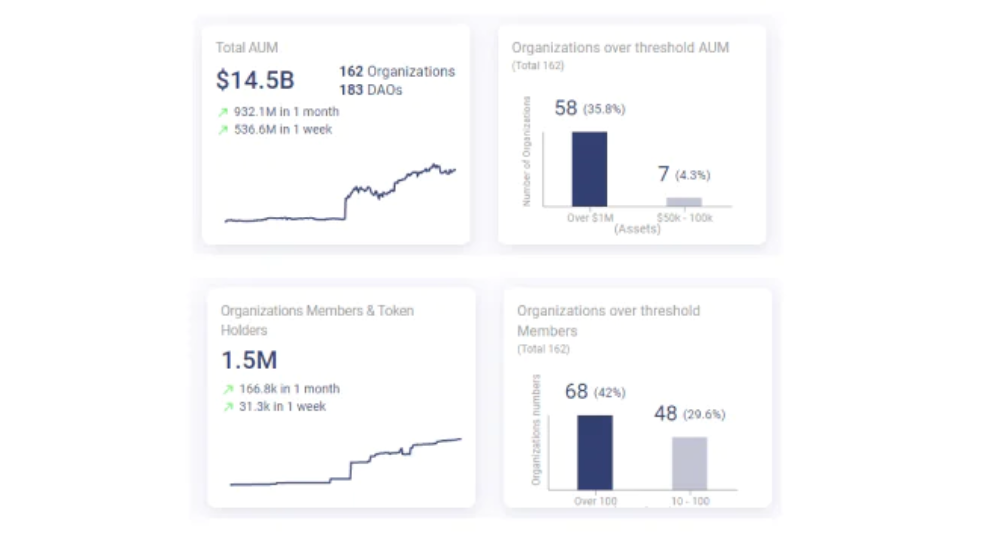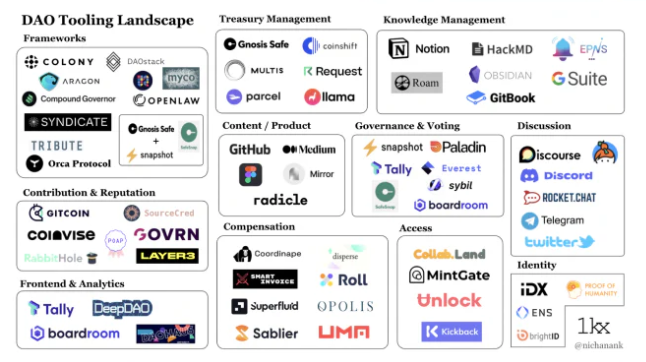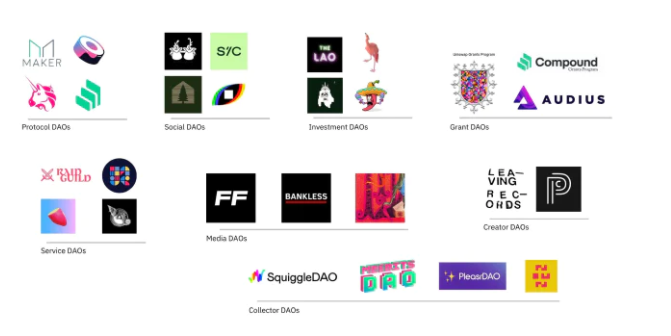Author: paulfinneyx
Summary ✦
This article is divided into six parts:
1. What is a DAO and how it differs from traditional companies
2. According to the purpose, DAO is divided into 7 categories
3. How to create a DAO
4. Those commonly used DAO tools
5. How DAO can replace the traditional corporate model
6. The future of DAOs
In the past 5 years, DAO has created a large number of high-value cryptocurrencies on Ethereum. Whether it is the theft of The DAO on Ethereum in 2016, the ConstitutionDAO trying to acquire the US Constitution, or the Klima DAO trying to solve the climate problem, as long as you surf the Internet every day, you must have heard the word "DAO".
Cooper Turley, a well-known builder in the DAO field, once said: "A DAO is just a chat room for shared bank accounts。"There is some truth to this statement, but it does not reflect what the DAO can achieve.
At the time of writing this article,There are more than 100 active DAOs in the world, and the top 20 alone manage more than $14 billion in digital assets.

This figure is enough to prove that the DAO is a very important thing. Look at this amazing growth, DAO is not just a threat to the traditional corporate system,They are becoming the new "Limited Liability Company"”。
It has seen explosive growth this year due to the rapid development of the DAO ecosystem, which to some is a "new" blockchain concept. However, it has been around and developed for a long time - what is it? How do they contribute to the field of encryption?
Before getting to know DAO, let's start with a little story.
Long ago, in the early days of business management development, there were two basic organizational structures—Hierarchy and Networks。
At first, hierarchies seem like the perfect structure for getting things done. A boss and some titled employees. However, as the development progressed, this structure began to break down: management could not effectively manage employees who did not talk to each other, the decision-making process was slow due to passing too many people, and importantly,it isolates employees—Of course, except for the high-level.
People are stuck in companies and dissatisfied with their jobs. There are many problems with traditional organizations:Hierarchy, internal politics, unfair pay, lack of feedback, reliance on experience, etc.They are forced to adapt to traditional working models. How nice it would be, they thought, if there was no hierarchy at all, and work would be completely decentralized. It may be that one of these people is committed to making it a reality, so,first level title。
01
How are DAOs different from traditional companies?
DAO is an autonomous, Internet-based community. This is completely not available in traditional companies. community passandandthe same goalBringing contributors together: creating value by enforcing a set of rules on the blockchain.
This set of rules is created by DAO members, managed by an open-source blockchain protocol, and can act automatically without an intermediary. That's what we call"social contractsecondary title
1. Decentralization of rights
The owners of The DAO are not a handful of founders and investors, but the people who create value for it. Ownership, power, and control are spread throughout the community, and everyone has influence regardless of their "history."It upends the idea of a single person or entity "owning" an organization.
secondary title
2. Transparency
Since on the blockchain, anyone can see all the operations and funds of the DAO, which makes the DAO more transparent than traditional companies. This transparency greatly reduces the risk of corruption within the company.
This structure deprives companies of control over information, and open source means that many people can contribute to a project without permission from outside sources.
This transparent operating framework is the most important part of DAOsecondary title
3. Autonomy
Since the DAO is decentralized, it does not belong to an individual or entity, so it cannot be governed in traditional ways.
The governance and rules of each DAO are encoded in smart contracts and cannot be changed unless the DAO members vote.
DAOs make the ecosystem fairer by giving all members equal decision-making power.secondary title
4. Efficiency
When those who share a common goal and passion work together, they ensure the best and most effective results.
secondary title
5. Anonymous
The DAO does not require or force you to reveal your identity.
The DAO allows investors to send money from anywhere in the world. Since members remain anonymous on the network, they can be more flexible and experimental in their funding decisions and investments.
DAO is a complex subject with many parts that can be flexibly adjusted. However, in the final analysis,They are simply businesses run by teams of different individuals, rather than being run by a single leader. The rules and functions of the management team may change over time, but the spirit in which the organization operates will always be the same.
The DAO offers its members a unique opportunity simply not available anywhere else in the market: complete freedom.first level title
02
DAOs for various purposes
The Generalist divides currently active DAOs into two categories:andandsocial orientation。

(Classified DAOs)
Tech-oriented DAOs focus more on building out the crypto space and maintaining on-chain governance.
secondary title
1. Create a protocol
Rules Matter to DAOs, some DAO protocols can provide community members with an operating framework to help people quickly build a DAO.
The DAO protocol introduces transferable ERC20 tokens with secondary market value. These tokens are used to govern the protocol. Token holders have the power to propose ideas, vote and implement changes to the network.
secondary title
2. Bring people together
In a world concerned with finance capital,Social capital is often overlooked or undervalued. Social DAOs bridge the gap by prioritizing social capital.
The goal of a social DAO is to create a strong community of people with a common interest, while enjoying the benefits of a DAO, such as shared ownership and permissions. Social DAOs aim to create digital native tribes and challenge traditional forms of community.
Friends with Benefits:FWB describes itself as the ultimate cultural membership, a community of their favorite Web3 artists, operators and thinkers, bound together by shared values and shared inspiration (FWB).
Seed Club:Seed Club is a community with social tokens, creator economy and crypto space. As a Web3 incubator, it brings together and serves the most promising social projects every year.
CabinDAO:secondary title
3. Aggregated capital
While various DAOs have brought various tokens to the world, we need DAOs that focus on investing. Unlike social DAOs, theseInvestment DAOs aim for financial returns。
The goal of these DAOs is to allow members to pool funds and invest in projects at an early stage. Unlike traditional VC firms, this decision-making is fair.
The LAO:The LAO is a global community of Ethereum enthusiasts and experts. Their goal is "to enable people from all over the world to use the power of capital to inspire and support the projects they love."
Neptune:Neptune's goal is to invest in various liquidity opportunities in the DeFi ecosystem. Members of Neptune pool funds and then vote on investment strategies.
MetaCartel:secondary title
4. Funded projects
Funded DAOs are designed to advance the wider ecosystem by supporting promising projects and opening paths for new Web3 contributors through grants.
The community donates funds and decides to distribute this funds to various contributors in the DAO in the form of governance proposals.
Uniswap Grants:UGP's goal is to ensure the continued growth of this passionate ecosystem, and it has awarded $1.4 million to 38 projects focused on tooling, usability, security reviews, documentation, community work, and education.
Compound:secondary title
5. Talent allocation
A community with excess talent needs to direct creativity to the right places.DAO-as-a-service are essentially talent agencies for the crypto world, which brings together manpower and uses it for specific projects. Here, the effort is usually rewarded with erc20 tokens.
RaidGuild:RaidGuild bills itself as "the premier design and development agency for the Web3 ecosystem". Create positive-sum value for the Ethereum ecosystem through shared resources, branding, and collaborative tools.
DAOhaus:DAOhaus is a community of contributors collaborating directly to design, build, and communicate actual products. It is the hub to which each working group makes a budget request.
Yam DAO:secondary title
6. Production content
Media-type DAOs generate public content, usually by collaborating and sharing rewards, so as to maintain the autonomy of governance.
Media DAO breaks the traditional relationship between authors, streaming media and readers, allowing people from all over the world to participate in content production.
Forefront:As a curator, influencer and creator, Forefront aims to be the content and community hub for the thriving social token. Forefront calls itself a pioneer in the exploration and construction of the Web3 playground.
Bankless:Bankless DAO is a decentralized community whose mission is to drive adoption and awareness of the monetary system through the creation and dissemination of Bankless media, culture and education.
DarkStar:secondary title
7. Accumulate Assets/Collections
There are DAOs that unite contributors around specific assets or collectibles (mainly NFTs). Collectible DAOs also serve as curators for certain projects, primarily seeking to curate NFTs with long-term value.
SquiggleDAO:SquiggleDAO is an on-chain generative art DAO foundry. This DAO exists to support and collect generative art.
MeebitsDAO:The goal of MeebitsDAO is to fund innovative projects around the Meebits ecosystem.
PleasrDAO:first level title
03
text
Launching a DAO is like creating an NFT, easier said than done.
Although this process is quite convenient and there are many tools to help you create, you do need to have sometechnical prerequisites。
DAO needsBuild good structures ahead of timesecondary title
1. Lay a solid foundation
If you want to try to create your own DAO, there is one thing you must have: a crypto wallet. Get your wallet ready, andFind fellow travelers who also want to build a DAO.
Clarify collective goals and work with peers to define the rules of the DAO.Identifying early on why a DAO exists, what it will do, and how it will work is key to building a strong foundation.secondary title
2. Establish Ownership
Once you have clarified the intent of the DAO and assembled a group of people who are as excited about it as you are, then,you need to assign ownership. Well-distributed ownership contributes to the further growth and development of the DAO.
Ownership is usually tokenized, and DAOs can assign ownership to their members in a number of ways.
secondary title
3. Set up the governance structure
Setting up the governance structure is the most important stage in the DAO setup process.
Token Weighted VotingToken Weighted Voting”。
Token holders are voters, and one token represents one vote. Members put their suggestions in likeSnapshotOn such a tool, votes are then made according to the preferences of other members, and the results are finally automatically executed through smart contracts.
secondary title
4. Set incentives and rewards
DAOs grow when members make a collective effort toward a collective goal, with incentives to drive that effort.A member's victory is a community's victory, which is why motivating and rewarding their efforts is a must.
DAOs typically start by distributing native governance tokens to early members and contributors. These tokens do not have any direct market value, but they represent shared ownership of the DAO's collective value. Some DAOs also reward contributors with ranks and titles, as well as widely circulated cryptocurrencies such as USDC or ETH.
Once a DAO is conceptualized and concretized, there are endless possibilities to improve and reward innovation.We're just scratching the surfaceDAO tools
04
DAO tools
Learn about DAOsThe required content is the first step in building a DAO. Now that you've taken the first step, you should now be familiar with the most used and important DAO tools in this space.

(Various DAO tools)
Web3-based DAO tools allow you to manage assets, making governance easier by voting on platforms, rewarding contributors, finding other DAOs, and more.
Here's a DAO toolset that can help your community move forward:
DAOstack:An open source software stack designed to build and support DAOs.
Gnosis Safe:Multisig wallet for managing digital assets of DAOs on Ethereum.
Proof of Humanity:A social authentication system on Ethereum.
Snapshot:An off-chain voting tool based on the IPFS decentralized storage system.
Discord:A channel for sharing ideas and discussing governance proposals.
CollabLand:A bot that provides token access and notification services for communities on discord or telegram.
Coordinape:Extend the community with tools to reward contributors, incentivize participation and manage resources.
SourceCred:A tool used by the community to measure and reward value creation.
Mirror:A publishing platform that allows creative projects to be funded through tokenized crowdfunding.
Tally:first level title
05
future organization
Current DAOs are crypto-oriented in their mission and purpose. They share a treasury, and all decisions revolve around how to invest or use those funds. This approach can be applied in a wide range of fields, not limited to managing cryptocurrencies.DAOs can be used to create almost any type of organization, such as organizations run more efficiently by artificial intelligence.
So far, we can be sure thatDAOs have the potential to replace traditional corporate models to build mid-sized companies in the future, but established large corporate entities will not be able to fully transition to DAOs.
secondary title
1. Platform management
Imagine having your favorite social media, food delivery or transportation apps all user-owned! The idea is to take traditional services like Facebook, Amazon or UberDAOization of Web2 companies。
For example, the current Uber model requires all users to agree to their terms. Because Uber owns the platform, it collects a cut from both drivers and riders.
Think of Uber as an app created by a community of users. Both the driver and the user control how it works and grows. The App is jointly owned by them, not a single individual or company. Everyone gets their fair share, there are no intermediaries to exploit, and most importantly,your data is safe。
Large corporations will either move to a more DAO-compliant model in the future, or they will end up as outliers among a group of companies governed by DAOs.
Encourage and reward early users to become evangelists for further development and expansion;
Empowering the community to make decisions and balance competing interests;
secondary title
2. Startups and Small Businesses
DAO can achieve more effective governance through Web 3.A lot of people are leaning towards this idea, and it wouldn't be too surprising if new startups adopt the DAO model and reject the traditional model.
There are many ways in which DAOs can impact startups:
Similar to a VC fund, people pool resources together to fund projects they believe in. With DAOs comes the added benefit of full transparency.
first level title
06
growing recognition
DAOs are becoming more and more popular, and as web3 gains more traction, it will continue on this path.
NFTs have taken over the internet, and it continues to attract the attention of the biggest names in the tech and music industries (even sportswear giant Adidas). This explosion fueled interest in DAOs as more and more people came together and pooled their funds to invest in these digital assets.
Some big names are entering the Web3 space with some revolutionary ideas, and for creating a DAO, like Kimbal Musk's charity DAO, to address food inequality. We will soon see more of these organizations forming DAOs for better governance and coming up with exciting solutions that create value.
The road of DAO has just begun,This means more interesting use cases are yet to be discovered, that alone is worth raising interest in the future of DAOs.
DAOs may be one of the most exciting things to happen at the intersection of economics, culture, and technology. It represents a fascinating new way that together we can organize and together create a whole new paradigm that moves humanity forward.
DAOs also represent a massive shift in the way we think about organizations and how organizations operate.We are on the cusp of a major change in the way the system works, and it will be interesting to watch how things play out over the next few years.
I believe,The next wave of business is not about one company or one industry, it's about building the economy— In my view, an economy is a series of interactions between different entities. These economies of the future will be powered by the collaboration of many individuals, companies, and organizations, each of whom will benefit from participation.
In the future, you will no longer work for the company.
You will sign contracts with various DAOs, and these organizations will become your new employers, customers, and partners.
As technology lowers the barriers of traditional business structures, a plethora of opportunities will emerge and individuals will have countless opportunities to be self-reliant, gain economic freedom, and ultimately do something they absolutely love.